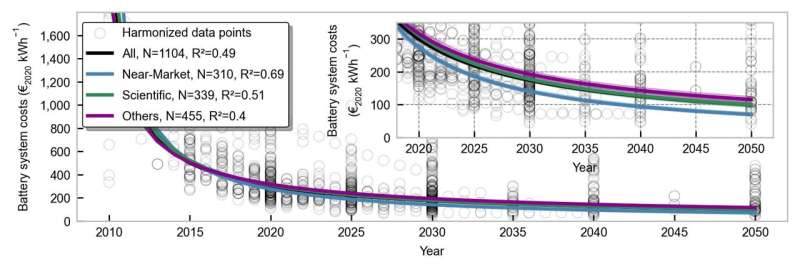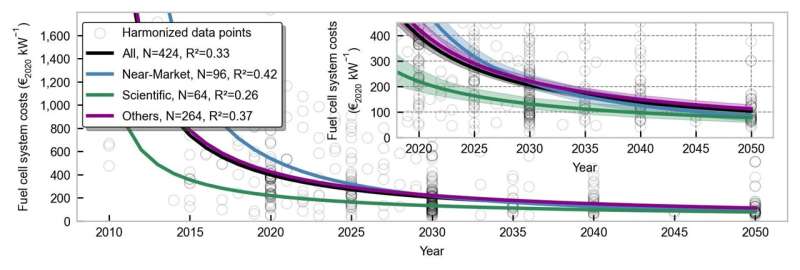
The electrification of road vehicles has already begun, with most automotive companies now investing in hybrid and electric cars. While these efforts could contribute to reducing carbon emissions worldwide, they have so far been primarily focused on cars, rather than trucks and heavy-duty vehicles for transporting goods.
The primary reason for this is that electrifying larger and heavier vehicles is technically challenging, as powering them for long periods of time would require more expensive and sophisticated battery technologies. Studies exploring the potential future of zero-emission heavy-duty vehicles have so far been relatively scarce, also due to the lack of available data related to the costs of fuel cells and truck batteries.
Researchers at Fraunhofer Institute for Systems and Innovation Research ISI and Karlsruhe Institute of Technology (KIT) recently set out to fil this gap in the literature, by forecasting changes in the cost of truck batteries and fuel cells over the next decades. Their analyses, outlined in a paper published in Nature Energy, suggest that the costs of both truck batteries and fuel cells could decline over the next few years, facilitating the electrification of heavy-duty vehicles.
“Discrepancies exist regarding current cost levels of fuel cells and batteries for decarbonizing road transport, as well as the pace and extent of achievable cost reductions,” Steffen Link, lead author of the paper, told Tech Xplore. “Our findings emphasize that zero-emission truck costs are primed to decline much faster than expected in previous studies, with cost-effective operations appearing feasible today. Given the short ownership times of heavy commercial trucks (typically 3-6 years), market diffusion will happen substantially quicker than for private passenger cars.”
As part of their study, the researchers collectively analyzed data derived from over 200 sources published between 2010 and 2023, including peer-reviewed papers, industry announcements and analyst reports. Using various statistical methods, including normal and robust regression techniques, they derived possible cost projections for truck batteries and fuel cells, and then validated the robustness of their forecasts.

“The feasibility of rapid and substantial cost reductions was evaluated by considering component-specific minimum costs, assessing implied market evolution, and comparing with historical advances in other energy technologies,” Link explained. “Ultimately, we compared these cost projections against expected breakthrough costs from other research and incorporated them into a total cost of ownership (TCO) framework to evaluate the cost-effectiveness of battery-electric and fuel cell trucks versus diesel trucks over several years.”
The results of the analyses carried out by Link and his colleagues suggest that battery and fuel cell system costs are likely to decline significantly faster than previous studies had anticipated. Nonetheless, the researchers observed significant discrepancies between the estimates provided in academic and industry resources, which they hypothesized to be linked to the maturity of the technologies tested by the authors.
“While near-market sources turn out to be the most stable source for batteries, their predictions are more optimistic than those from scientific sources,” Link said. “In contrast, the opposite is true for fuel cell cost predictions, with the scientific sources being more optimistic and often close to floor or target costs, warranting careful consideration. Thus, battery system costs will cut 200 EUR/kWh soon and approach 100 EUR/kWh towards the late 2040s, while fuel cell costs might reach 150 EUR/kW in the late 2030s.”
Based on the results of this recent study, the cost of battery-powered electric trucks could eventually become aligned with that of diesel trucks. To facilitate the future widespread commercialization of these vehicles, however, policymakers and automotive companies should start taking steps to promote their deployment, for instance by compiling a robust product portfolio, building the necessary battery charging infrastructure and introducing effective regulations.
“Immediate investments in electricity grids and charging infrastructure must be prepared to avoid delays in deploying battery-electric trucks,” Link added. “Our future work will focus on hard-to-electrify and specialized transport applications, including more detailed techno-economic assessments and in-depth battery analyses. In addition, we aim to support the deployment of charging infrastructure (incl. grid expansion planning) for private depots and public fast-charging parks.”
More information:
Steffen Link et al, Rapidly declining costs of truck batteries and fuel cells enable large-scale road freight electrification, Nature Energy (2024). DOI: 10.1038/s41560-024-01531-9
© 2024 Science X Network
Citation:
Rapidly declining costs of batteries and fuel cells could soon facilitate the electrification of heavy-duty vehicles (2024, June 18)
retrieved 8 August 2024
from https://techxplore.com/news/2024-06-rapidly-declining-batteries-fuel-cells.html
This document is subject to copyright. Apart from any fair dealing for the purpose of private study or research, no
part may be reproduced without the written permission. The content is provided for information purposes only.



